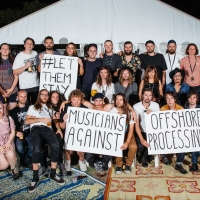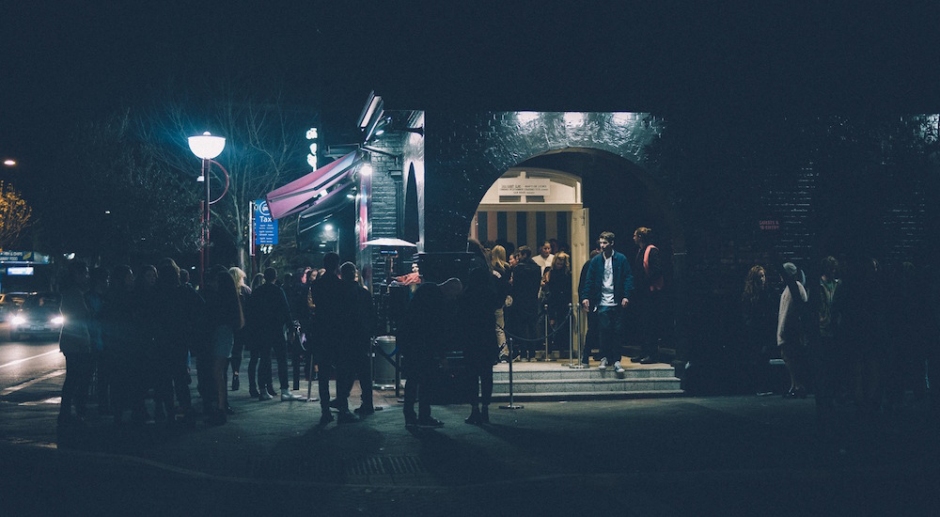 Australian musicians join the call to #LetThemStayBig Scary lead a sizeable chunk of the 2016 Laneway lineup to stand for human rights.
Australian musicians join the call to #LetThemStayBig Scary lead a sizeable chunk of the 2016 Laneway lineup to stand for human rights.

That time Perth trialled lockout laws and decided against it
A look back at Perth's brief dalliance with lockout laws, and why they never came to pass.
2016 has been the year that lockout laws have really come under fire following a plethora of sobering pieces on the subject, musician backlash, the introduction of the laws in Queensland, and one very ill-advised foray into the world of Facebook from Sydney Premier Mike Baird.
Sitting over here in WA it's been heartbreaking to watch - plenty of us in the office have a strong affinity for Sydney’s nightlife, and of course being in this industry it’s been sad to watch a once-incredible nighttime vibe reduced to a ghost town.
One of our writers went along to the massive Keep Sydney Open rally last weekend, but we wanted to find some meaningful way to contribute to the conversation beyond sharing words from people more involved than us, and petitions trying to help the cause.
And then it occurred to us – hadn’t Perth gone through this before?
And it turns out we did, in 2009, when a six-month lockout trial was implemented that called for nightclubs to shut an hour earlier (from 6am to 5am), and stop letting people in an hour before close i.e. 4am.
With this in mind, we reached out to Simon Barwood, head of the WA Nightclub Assocation, to get a bit more history on how and why Perth hasn’t joined states like NSW and QLD in bringing in lockout laws.
For reasons those of us that haven't forgotten what it's like to enjoy going out for a few drinks with your friends, why they didn't go beyond a trial stage are pretty obvious: “The lockout trial was ineffective firstly because blanket lockouts are bad policy. Most alcohol related incidents do not occur on licensed premises – premises are highly regulated and scrutinised and licensees are highly incentivised to take harm minimisation measures to prevent assaults and other alcohol related incidents on their premises,” Barwood explains.
In addition, due to WA’s staggered approach to licensing (more on that later), only a few venues were actually affected: “The lockouts, as imposed, were ineffective because they only applied to a small number of premises (i.e. nightclubs) at a time [of the night] when very few alcohol related incidents were taking place (i.e. after 4am)…”

Look, it's no Oxford Street in its heyday, but it's people on the street at night having a good time.
Around the same time, WA police had begun a “concerted effort to use their powers to arrest and move on against offenders on the streets, where the vast majority of offences were occurring. This had a dramatic effect on turning the situation around in Northbridge. Subsequently crime statistics in Northbridge have continued on a sustained down-trend.
“This is a very good news story for WA, Northbridge and WA Police, one that rarely gets told, and the statistics are readily available.”
But to understand why we aren’t currently going to war with our government over lockout legislation, it’s important to recognise that WA “has a very different starting point from NSW and QLD due to our licensing regime, specifically staggered closing of premises,” says Barwood.
“De-regulation of liquor licensing in eastern states’ jurisdictions saw all premises trading all night. In WA, taverns and hotels (which account for the vast majority of licensed premises) are legislated to close by midnight.”
These venues can apply for an Extended Trading Permit (ETP) to trade later, which were originally introduced to allow for special occasions like New Year’s, “but in the early 2000s hotels and taverns aggressively sought these permits for every Friday and Saturday and achieved initially a one-hour extended period, that was followed a few years later by extending to two hours (i.e. 2am closing) in Northbridge.
“Nightclubs (around 45 operating licensed premises in WA) are a separate license category with the purpose of providing entertainment for patrons, with alcohol sales ancillary. The intention of the WA Liquor Act was that nightclubs would exclusively provide entertainment for patrons after midnight.”

Increased barriers to entry may mean you line up for longer, but it also weeds out lesser elements.
In addition to providing entertainment (bands, DJs etc.), there is a stronger focus on barriers to entry (ID scanners, door charges, dress codes), something that Barwood says, “naturally filters patrons and does not simply provide the next place to continue consuming alcohol.
“The hotel/tavern business model of low barriers to entry (no door charge), generic entertainment (if provided at all) and 100% focus on profit generation from bars is simply not appropriate for late night trading.”
What it essentially means for WA is that there are a whole bunch of small bars that open til midnight, some venues that open til 2am, and then nightclubs open until 5am around the Northbridge and Perth city area. This verses the “all venues trading all night” model adopted elsewhere.
“NSW and QLD are essentially now paying the price for de-regulation of their liquor licensing system. Unwinding a system that allows all premises to trade all night is going to be problematic…” says Barwood, “It’s interesting that alternative solutions now being proposed include staggered closing and the introduction of ID scanning. In this circumstance WA is, for once, years ahead of the eastern states. The conditions that are requiring such a heavy-handed approach in NSW and QLD are simply not present in WA.
“Staggered trade is the single best feature of the WA system; NSW and QLD could study this and easily implement what is Australia’s best practice licensing system.”
Even with all this in place for WA, lockout legislation is still a very real possibility to expand outside of NSW and QLD and into other states: “I’m confident that lockouts are not required in WA, however a senate inquiry into the need for a nationally-consistent approach to alcohol-fuelled violence has been announced. WANA will be making a submission but I’m not as confident that WA’s voice will be heard strongly enough. It would be ridiculous if WA was forced to adopt policies like lockouts because other states have issues resulting from adopting an inferior licensing system…
“WA really ought to be promoting our licensing system, venue management and entertainment precinct policing strategies as the best in the country.”
And assuming we don’t re-visit the world of lockout laws once again, what’s the future of Perth’s nightlife? “Venues tailored to specific markets. We have seen this occurring very successfully with small bars. The days of the old-fashioned generic beer barn are over, patrons now prefer more intimate venues with a high standard of service in precincts where they feel safe. An increasing diversity of premises and experiences creates a rich and varied nightlife that is attractive to visitors and adds interest and sophistication to our city.”
Please don't take this article as us Perthites bragging about our amazing nightlife - it's still got a long way to go, and we're still shaking the dreaded 'dullsville' tag. But hopefully it serves to show that you don't need to shut down entire nightlife districts to solve the problem of "alcohol-fuelled violence"; there are far better strategies out there that can help preserve our right to party. And we dearly hope the continued questioning of current methods in New South Wales and soon-to-be Queensland can arrive to similar solutions.
 Australian musicians join the call to #LetThemStayBig Scary lead a sizeable chunk of the 2016 Laneway lineup to stand for human rights.
Australian musicians join the call to #LetThemStayBig Scary lead a sizeable chunk of the 2016 Laneway lineup to stand for human rights.
 Living with invisible illnessJust because you don't look sick, doesn't mean you're not.
Living with invisible illnessJust because you don't look sick, doesn't mean you're not.